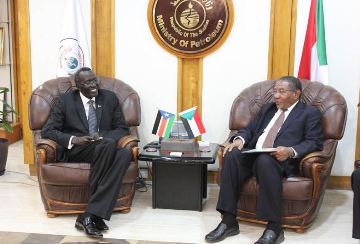Juba, Khartoum begin oil fee negotiations
March 2, 2015 (JUBA) – South Sudan and its northern neighbour have started negotiations on provisions of the 2012 Cooperation Agreement, focusing on crude oil flowing through Sudanese territory.

“We will be talking of the continuation and in particular the consultation on how to implement and promote the Cooperation Agreement signed between the two countries in September 2012,” South Sudan’s petroleum minister, Stephen Dhieu Dau, told reporters on Tuesday.
The minister did not elaborate on what provisions of the agreement would be discussed.
In January, Dau said the young nation would consider whether to continue paying Khartoum $25 per barrel of oil or push for reduction.
The move, he said, was as a result of global fall in oil prices which has badly affected South Sudan’s largely oil-dependent economy.
Juba pays Khartoum $25 per barrel for oil transported through the latter’s territory.
Dhieu, however, said the $25 per barrel of oil being paid was meant to expedite the repayment of a $3 billion compensatory package they agreed to pay Sudan following South Sudan’s cessation in July 2011.
In Khartoum, the official news agency SUNA reported that Awad met with the president Salva Kiir and stressed Sudan’s keenness to enhance and develop relations and economic cooperation between the two countries.
OIL DEPENDENT ECONOMY
South Sudan heavily relies on oil to fund up to 98% its budget. Oil production in Unity state closed in December 2013 when rebels overran the production fields and reduced oil output by a quarter.
The situation has, however, worsened as global oil prices continue to decline amid a decline in the local South Sudanese Pound currency (SSP) against the dollar.
South Sudan received $3.376 billion in oil revenue in 2014, the petroleum minister announced early this year. However, the young nation paid $884 million to Khartoum, $781 million for repayments of loan and retained $1.711 billion as net amount.
The over a year-old conflict in South Sudan led to the closure of oilfields in Unity state as daily production dropped to 160,000 bpd.
(ST)
